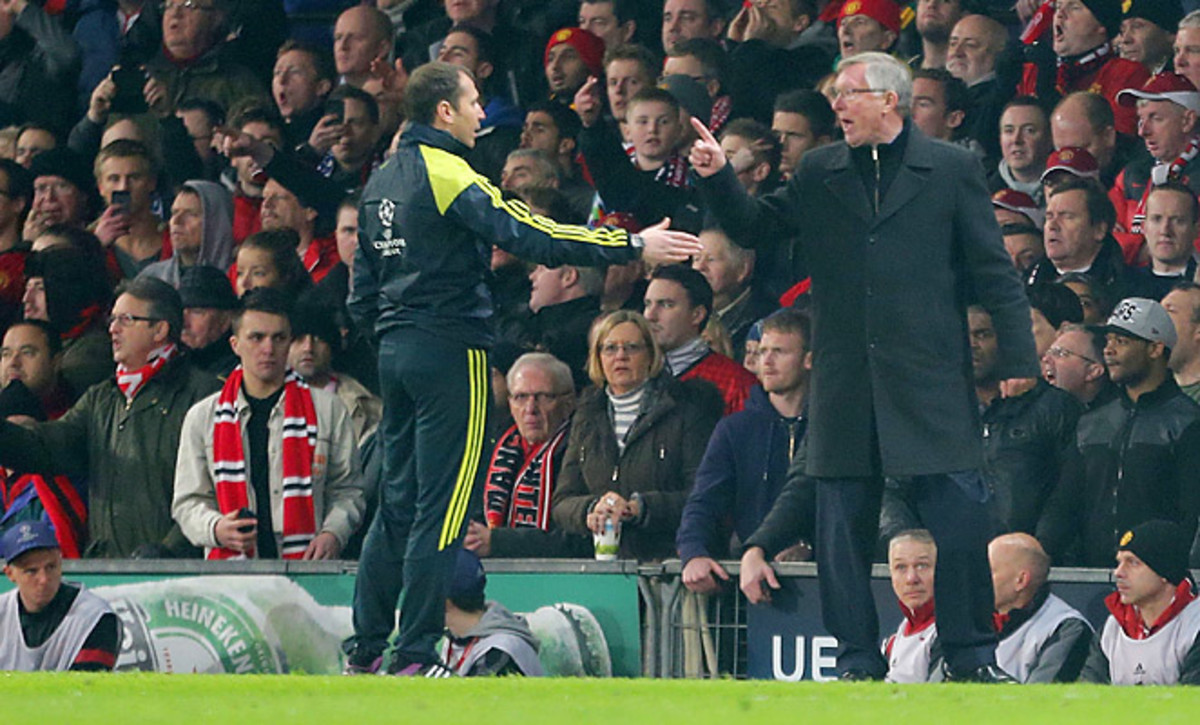
Controversial red card changed complexion of Madrid-United tilt

Sir Alex Ferguson reacted angrily to Nani's red card in the second half against Real Madrid.
Tom Purslow/Getty Images
There was no doubt about the moment that changed the game. Manchester United had been leading 1-0 on Tuesday night, 2-1 on aggregate, and was winning the tactical battle when, 11 minutes into the second half, Nani leapt to try to take down a dropping clearance from Rafael. His raised foot caught Alvaro Arbeloa in the stomach, and Turkish referee Cunet Cakir decided, to widespread surprise, that he was guilty of serious foul play and showed a red card.
Replays showed Nani was looking at the ball and probably wasn't aware of the exact position of Arbeloa, but in a sense that isn't really the point. The foot was high, but the rulebook demands "excessive force" for a challenge to become a sending-off offense. Was that excessive? Nani probably could have withdrawn his foot, but it was dangling; careless, perhaps, but it was hard to see how the force involved could have been construed as excessive. Given his foot did catch Arbeloa high, perhaps it did endanger him, but it still seemed a very harsh call.
Sir Alex Ferguson, the Manchester United manager, chose not to attend the post-match press conference, instead sending assistant Mike Phelan, who said, "It's a very distraught dressing room and a very distraught manager. [Ferguson] is not in any fit state to speak to the referee. ... it speaks volumes that I'm sitting here and not the manager of this club." No United player was allowed to stop to speak to the press in the post-match mixed zone: blanket silence, it was evidently decided was the best way to avoid a diplomatic incident.
LYTTLETON: Ronaldo rescues Madrid
Until the red card, United had been in charge. Ferguson used Ryan Giggs, making his 1,000th senior appearance (including games for Wales and Great Britain) on the right, his prime duty seemingly being to cut off the supply to Cristiano Ronaldo. He achieved that -- and tracked the forward surges of Fabio Coentrao superbly, while also offering an attacking treat with his range of passing.
Danny Welbeck was used in the position many expected Wayne Rooney to occupy, playing off Robin van Persie. His job was less to create than to disrupt Xabi Alonso and prevent him being the metronome who set Real's tempo. He achieved that superbly, while also offering attacking thrust. Only his finishing, perhaps, is a little lacking -- as was seen when he rather snatched at the opportunity that presented itself when Van Persie's drive was parried by Madrid goalkeeper Diego Lopez, striking the ball against the goalie, but his intelligence and work rate were first-rate. He and Giggs embodied United's approach -- conservatism with an attacking edge.
There was clearly a feeling, too, that Real might be vulnerable to pace and United goalie David de Gea repeatedly kicked long and early, trying to use Nani's pace. Real's more obvious weakness is in defending corners -- 21 percent of the goals they'd conceded this season before Tuesday night had come from set pieces -- and United struck the post the first time it got the delivery right. Giggs sent in the corner from the right after 21 minutes and Nemanja Vidic -- one of only four United players in the box; an indication of how it feared Real's ability to counter -- headed against the post.
CREDITOR: Altidore, Gomez red hot; Americans Abroad
Three minutes into the second half, United had its reward, Rafael's charge leading an attack that ended with Welbeck getting a touch on Nani's cross - a touch that led to Sergio Ramos diverting the ball past his own keeper. But then came the red card. That, obviously, has a huge impact in itself, but United's reaction was significant. Welbeck was forced left to take Nani's place, allowing Xabi Alonso to push on more. United got deeper and deeper, setting up on the edge of its own box. Was that degree of negativity necessary? Did Real push United back, or did United sit back and allow Real to come at them?
Rafael cleared a Raphael Varane header off the line with a hand -- unspotted by Cakir or deemed unintentional -- five minutes after Nani's dismissal, and five minutes after that substitute Luka Modric jinked by Michael Carrick and arced a shot in off the post. For a team defending as deep as that, it's almost impossible to stop long-range efforts; you accept there will be a handful, and you just hope they don't go in. Three minutes later, with United still rocking, Gonzalo Higuain drove a ball across goal, and Ronaldo turned it in. United had chances after that, but the sense was that it was Real, having brought on Modric to take advantage of United's numerical disadvantage, that had seized opportunity when it arrived.
As even Jose Mourinho acknowledged, "independent of the decision, the best team lost. We didn't play well, we didn't deserve to win." There may have been some not-too-subtle politicking in his words, but his side was second-best until the red card. Even if the decision was correct, it was a game-changing moment that had little to do with his side. Ferguson got the tactics right, but sometimes matches are determined by forces beyond a manager's control.
MCCALL: U.S. women face first big test under Sermanni




